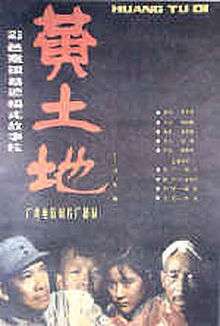Yellow Earth
Yellow Earth (simplified Chinese: 黄土地; traditional Chinese: 黃土地; pinyin: Huáng tǔdì) is a 1984 Chinese drama film. It was the directorial debut for Chen Kaige. The film's notable cinematography is by Zhang Yimou. At the 24th Hong Kong Film Awards ceremony on 27 March 2005, a list of 100 Best Chinese Motion Pictures was tallied, and Yellow Earth came in fourth.[1] The film was produced by Guangxi Film Studio (simplified Chinese: 广西电影制片厂; traditional Chinese: 廣西電影製片廠; pinyin: Guǎngxī Diànyǐngzhìpiàn Chǎng).
| Yellow Earth | |
|---|---|
 Theatrical release poster | |
| Directed by | Chen Kaige |
| Written by | Chen Kaige Zhang Ziliang |
| Starring | Wang Xueqi |
| Music by | Zhao Jiping |
| Cinematography | Zhang Yimou |
Production company | Guangxi Film Studio |
Release date | 1984 |
Running time | 89 minutes |
| Country | China |
| Language | Mandarin |
Zhang Yimou, a colleague of Chen, photographed the film. Richard James Havis, author of Changing the Face of Chinese Cinema: An Interview with Chen Kaige, said that the film was the first Chinese film "at least since the 1949 Communist Liberation, to tell a story through images rather than dialog."[2] Therefore, the film attracted controversy in China. Havis added that the film "was also equivocal about the Communist Party's ability to help the peasants during the Communist revolution", a position which differed from that espoused by the propaganda films that were produced after 1949."[2]
Background
Yellow Earth is set in Shaanbei, located in the northern part of Shaanxi province in the northwest of China, in early spring 1939. The Chinese Communist Party and the Kuomintang have stopped fighting one another and are working together to overwhelm the invading Japanese. The provinces are divided into Kuomintang-controlled areas and Communist-controlled areas. Shaanxi is divided into three sections: the northern and southern parts are controlled by the Kuomintang, and the middle by the Communists. Because of their co-operation, navigation between the areas is permitted.
Plot
Gu Qing, a soldier from the propaganda department of the CCP Eighth Route Army in CCP-controlled Shaanxi, travels alone from Yan'an to the northern KMT-controlled area of Shaanxi, Shanbei, with the task of collecting the peasants' folk songs in order to re-write them with communist lyrics in order to boost the morale of the Eighth Route Army soldiers.
Yellow Earth begins with a scene depicting a communist soldier walking several miles. He reaches a small village where he is assigned to live with a poor family with the task of recording local folk songs for use in the army later. He learns the hardships of peasant life and especially of that of a peasant girl named Cuiqiao. The story then focuses on the girl, who at only age 14 is forced to marry a significantly older man as her wedding dowry was used to pay for her mother's funeral and brother's engagement. The Communist soldier, called "Brother Gu", attempts to dissuade Cuiqiao from running off and joining the CCP, but recognizes her despair. After her marriage, Cuiqiao crosses the Yellow River at night but it is unclear whether she made it or not. The story then fast forwards to a rain dance being performed by the villagers, as the land has dried up and peoples' crops have died.
Reception
Richard James Havis, author of Changing the Face of Chinese Cinema: An Interview with Chen Kaige, said that the film "immediately brought attention to" the "Fifth Generation" of Chinese filmmakers".[2] The film's international premiere occurred in the 1985 Hong Kong International Film Festival. Havis said that the film "proved a sensation" there.[2]
See also


Notes
- "HONG KONG FILM AWARDS' LIST OF THE BEST 100 CHINESE MOTION PICTURES". MUBI. Retrieved 2010-12-25.
- Havis, Richard James (Winter 2003). "Changing the Face of Chinese Cinema: An Interview with Chen Kaige". Cineaste. 29 (1): 8–11. ISSN 0009-7004. JSTOR 41689663.
External links
- Yellow Earth on IMDb
- Yellow Earth at AllMovie
- Yellow Earth at the Chinese Movie Database
- Yellow Earth at Rotten Tomatoes